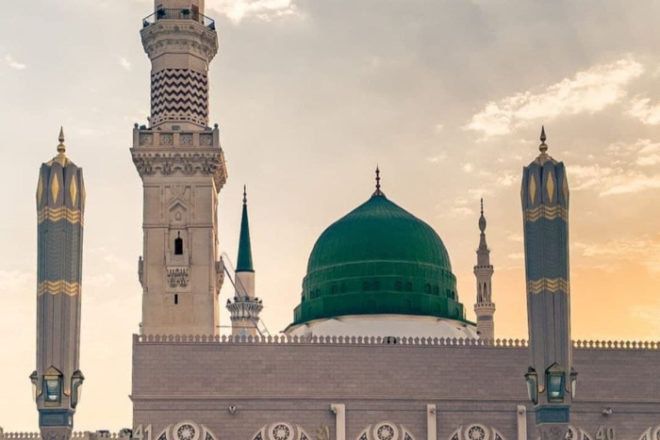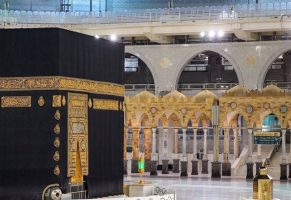
The Noble Lineage of Hazrat Rasulullah (sallallahu ‘alaihi wasallam)
Hazrat Rasulullah (sallallahu ‘alaihi wasallam) hailed from the Quraish clan. The Quraish are all those who are descendants of Nadhr bin Kinaanah (i.e. Nadhr the son of Kinaanah). This is the view of the majority Ulama. Nadhr bin Kinaanah was the 13th ascendant of Hazrat Rasulullah (sallallahu ‘alaihi wasallam).
The complete lineage of Hazrat Rasulullah (sallallahu ‘alaihi wasallam) until Nadhr bin Kinaanah is as follows:
Muhammed, the son of Abdullah, the son of Abdul Muttalib, the son of Haashim, the son of Abde Manaaf, the son of Qusayy, the son of Kilaab, the son of Murrah, the son of Ka’b, the son of Lu’ayy, the son of Ghaalib, the son of Fihr, the son of Maalik, the son of Nadhr, the son of Kinaanah.
Since the great-grandfather of Hazrat Rasulullah (sallallahu ‘alaihi wasallam) was Haashim, the close family relatives of Hazrat Rasulullah (sallallahu ‘alaihi wasallam) from the Quraish were known as “Banu Haashim” (the descendants of Haashim).
Hazrat Waasilah bin Asqa’ (radhiyallahu ‘anhu) reports that Hazrat Rasulullah (sallallahu ‘alaihi wasallam) said, “Allah Ta’ala selected Banu Kinaanah from the children of Hazrat Ismaa’eel (‘alaihis salaam), and from Banu Kinaanah, He selected the Quraish, and from the Quraish, He selected the Banu Haashim, and from the Banu Haashim, He selected me (to be His final Messenger).” (Saheeh Muslim #2276)
The Noor of Hazrat Rasulullah (sallallahu ‘alaihi wasallam)
It is mentioned that Nadhr bin Kinaanah was a person who enjoyed great dignity and honor among his people. He carried the noor of the nubuwwah of Hazrat Rasulullah (sallallahu ‘alaihi wasallam). This noor of nubuwwah was then passed down to Hazrat Rasulullah (sallallahu ‘alaihi wasallam) through his forefathers. This noor commenced from Hazrat Nabi Aadam (‘alaihis salaam), and was transmitted through his progeny, from father to son, until it reached Nadhr bin Kinaanah, and then finally reached Hazrat Rasulullah (sallallahu ‘alaihi wasallam). (Majma’u Bihaaril Anwaar 5/264)
Before Hazrat Rasulullah (sallallahu ‘alaihi wasallam) was born, his father, Abdullah, carried this noor, and its effect could be perceived from his face. It is reported that when Abdul Muttalib decided to get his son, Abdullah, married, he sent a marriage proposal on his son’s behalf for the hand of Aaminah, the daughter of Wahb bin Abde Manaaf (who belonged to the noble clan of Banu Zuhrah). At that time, Aaminah was under the guardianship and care of her uncle, Wuhaib bin Abde Manaaf.
Abdul Muttalib also sent a marriage proposal for himself, asking for the hand of Haalah, who was the daughter of Wuhaib bin Abde Manaaf and the cousin of Aaminah. Both proposals were accepted and both father and son (i.e. Abdul Muttalib and Abdullah) were married in the same gathering.
Hazrat Hamzah (radhiyallahu ‘anhu), the son of Abdul Muttalib, was born from her (Haalah). Hazrat Hamzah (radhiyallahu ‘anhu) was Rasulullah’s (sallallahu ‘alaihi wasallam) paternal uncle as well as his milk-brother as both had drank milk from Suwaibah. (Tabaqaat Ibnu Sa’d 1/76)
As Abdul Muttalib set out with his son, Abdullah, to perform the nikaah, they passed by a Jewish woman by the name of Faatimah bint Murr who was well-versed with the Towraat and Injeel. When her gaze fell on the noor of nubuwwah radiating from Abdullah’s face, she invited him to come to her and pleaded with him saying, “I will compensate you with a hundred camels if you come to me (and be intimate with me).”
Abdullah was a person of purity and nobility and he thus rejected her advances, and responded to her with the following couplets:
أما الحرام فالممات دونه والحل لا حل فأستبينه
فكيف بالأمر الذي تبغينه يحمي الكريم عرضه ودينه
As far as committing haraam is concerned, then I would rather die than commit it, and as for doing this act in a halaal manner, then (since we are not married,) this act cannot be halaal, so how can I intend doing it with you?
So how is it possible for you to be inviting me to this? A man of honour and nobility safeguards his honour and Deen.
Abdullah thereafter continued to the home of Aaminah where the nikaah was performed. A few days after the nikaah, when Abdullah once again passed by the same woman, she recognized that the noor no longer beamed from his face and thus enquired from him, “Where did you go after you left me?” Abdullah replied, “I got married to Aaminah, the daughter of Wahb bin Abd Manaaf, and after the nikaah, I stayed with her for three days.”
The woman finally revealed, “By Allah! I am not a woman of loose morals. However, when my gaze fell on the noor of prophethood emanating from your face, I desired that the noor be transferred from you to me (and I desired to be the mother of the Final Nabi of Allah Ta‘ala). However, Allah Ta‘ala has now transferred that noor to whom He wished.” (Tabaqaat Ibnu Sa’d 1/76-77 & Bidaayah wan-Nihaayah 3/350)
Source: The Illustrious Sahaabah
 Ihyaaud Deen An Effort to Revive Deen in Totality
Ihyaaud Deen An Effort to Revive Deen in Totality



